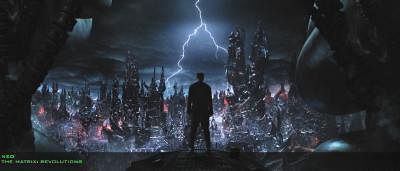
The
Matrix Revolutions
The
third and the last instalment of Matrix was released on November 5.
Here's a review of the movie to decide whether you want to end that
feeling of suspense.
Movie
Mom's Review
Please someone, get me the blue pill. I want to forget that this ambitious
and noteworthy series is ending so weakly.
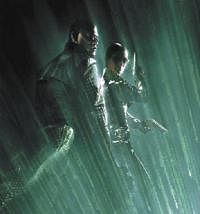 The
Matrix: Reloaded ended with the rebel forces of Zion preparing for
the imminent invasion of the machines. Whatever script problems it
had were more than made up for by the spectacular action sequences
and the promise of a third chapter that would bring everything together.
But that promise has been broken. "Revolutions" has the
weakest script of the three, with pretentious dialogue that provoked
laughter from the audience and a muddled structure that removes a
lot of narrative tension. Worst of all, it has nothing to compare
to the innovative "bullet time" effects of the first film
or the sensational highway chase scene and combat between Neo and
dozens of Smiths of the second. Instead of taking us to the next level,
it all seems like a tired rehash.
The
Matrix: Reloaded ended with the rebel forces of Zion preparing for
the imminent invasion of the machines. Whatever script problems it
had were more than made up for by the spectacular action sequences
and the promise of a third chapter that would bring everything together.
But that promise has been broken. "Revolutions" has the
weakest script of the three, with pretentious dialogue that provoked
laughter from the audience and a muddled structure that removes a
lot of narrative tension. Worst of all, it has nothing to compare
to the innovative "bullet time" effects of the first film
or the sensational highway chase scene and combat between Neo and
dozens of Smiths of the second. Instead of taking us to the next level,
it all seems like a tired rehash.
There are two
basic storylines. First, Niobe (Jada Pinkett Smith) has to pilot a
ship through some very tricky thing while guys in huge robot things
fight off zillions of cool flying octopus-like machines.
Second, Neo (Keanu
Reeves) and Trinity (Carrie-Anne Moss), on another ship, are heading
straight for city occupied by the machines for a Dorothy-and-the-wizard-in-Emerald
City-style confrontation.
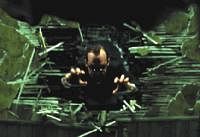 There
is a brief encounter with the Frenchman and Persephone (the still
unimpressive Monica Belluci) in a nightclub that appears to be occupied
with writhing bondage and discipline freaks. Neo visits the Oracle
in her cozy kitchen (now played by Mary Alice, replacing the late
Gloria Foster) and has a strange conversation about love and karma
in an antiseptic train station.
There
is a brief encounter with the Frenchman and Persephone (the still
unimpressive Monica Belluci) in a nightclub that appears to be occupied
with writhing bondage and discipline freaks. Neo visits the Oracle
in her cozy kitchen (now played by Mary Alice, replacing the late
Gloria Foster) and has a strange conversation about love and karma
in an antiseptic train station.
 The
dialogue thuds, a mishmash of barked orders and cardboard heroics.
But some of the performers manage to inject some life and dignity.
Jada Pinkett Smith is the Matrix's Han Solo, a charming rogue who
can pilot a ship better than anyone else. Nona Gaye (Zee) makes her
brief time onscreen memorable as a woman who overcomes her fear to
give everything she has to the revolution.
The
dialogue thuds, a mishmash of barked orders and cardboard heroics.
But some of the performers manage to inject some life and dignity.
Jada Pinkett Smith is the Matrix's Han Solo, a charming rogue who
can pilot a ship better than anyone else. Nona Gaye (Zee) makes her
brief time onscreen memorable as a woman who overcomes her fear to
give everything she has to the revolution.
Though Mary Alice
does her best, she cannot replace Foster, whose Oracle was the anchor
of the other two movies. Hugo Weaving remains superb as Agent Smith.
But it takes too long to get to the big final confrontation between
Neo and Smith and the fight is not worth the wait.
The scariest moment
in the movie was when it intimated that there might yet be another
episode.
 Parents
should know that as with the first two films there is a great deal
of battle violence. Characters are wounded and killed and there are
some grisly graphic images. Characters swear a lot, mostly the s-word.
Parents
should know that as with the first two films there is a great deal
of battle violence. Characters are wounded and killed and there are
some grisly graphic images. Characters swear a lot, mostly the s-word.
Families who see
this movie should talk about the source of the character names, a
veritable encyclopedia of mythological references. What do the discussions
of balance and choice mean? Of love and karma? Who is the Oracle?
Who is the Architect? What is the train?
Families who enjoy
this movie will also enjoy the first two in the series as well as
Blade Runner.
PC
Game Review
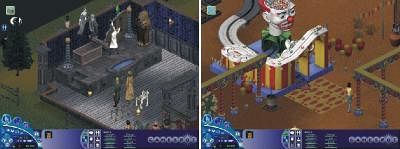
The
Sims: Making' Magic
Gamespot
rating 8.3. Publisher: EA Games. Developer:
Maxis. Genre: Strategy.
Release Date: Oct 28. Difficulty:
Medium. Learning Curve: about a half-hour.
Stability: stable. Requirements:
128 MB RAM, 4X CD-ROM, 4 MB VRAM, 1120
MB disk space, mouse, sound card, DirectX v7.0.
Maxis' world-renowned
PC strategy game The Sims, which lets you create and control the lives
of a virtual family of little computer people called "sims,"
has been extremely popular since its release in 2000. The game has
also given rise to a total of seven expansion packs, and the latest
and final of these is The Sims: Makin' Magic, which lets your family
of sims learn how to use magic wands, potions, and spells to turn
their unwanted neighbors into frogs, to shower themselves with riches,
and to create other wondrous effects. While some of Makin' Magic's
more-colorful additions seem a bit out of place, this final expansion
pack adds plenty of new things for you and your sims to do.
Like the last
few expansion packs for The Sims, Makin' Magic adds a great many new
household objects with which your sims can fill their houses. It also
adds a new outdoor "lot" area, named Magic Town, which you
can visit at any time. Here you can also completely scrap and redesign
yourself. Like other expansion packs for The Sims, Makin' Magic also
includes a few additional options that work with previous expansions.
For instance, if you have The Sims: Unleashed, you can temporarily
change one of your pets into a person. However, Makin' Magic also
lets your sims use magic spells (which emphasize the logic, cooking,
and mechanical skills) to circumvent mundane problems, like refilling
personal needs (also known as "motives") such as hunger,
fatigue, and social interfaction. Additionally, your sims can actually
perform magic shows, similarly to how they could put on various types
of shows in the previous expansion, Superstar. Many of these additions
completely eliminate the need for common chores, like continually
chatting up other sims to keep your social needs satisfied. For instance,
in Makin' Magic, a child sim can magically create an imaginary best
friend instead of having to hunt down other sims for conversation.
However, the expansion's décor is much more colorful than that
of the previous expansions.
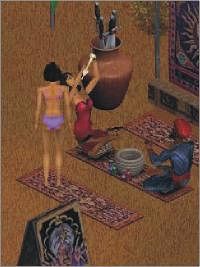 Regardless,
Makin' Magic gives you many new interesting things to do that will
likely draw your attention away from constant bathroom breaks and
naps. You begin a new game of Makin' Magic at home when a mystery
man appears at your door to drop off new magical equipment, including
a cauldron to formulate new spells, a new magic wand, and a handful
of spell components. From there you can build a comfortable home business
harvesting beeswax and elderberries. If you'd prefer, however, you
can use these components as spell ingredients, or you can use them
to barter for other spell components or magic items from various vendors
in Magic Town.
Regardless,
Makin' Magic gives you many new interesting things to do that will
likely draw your attention away from constant bathroom breaks and
naps. You begin a new game of Makin' Magic at home when a mystery
man appears at your door to drop off new magical equipment, including
a cauldron to formulate new spells, a new magic wand, and a handful
of spell components. From there you can build a comfortable home business
harvesting beeswax and elderberries. If you'd prefer, however, you
can use these components as spell ingredients, or you can use them
to barter for other spell components or magic items from various vendors
in Magic Town.
Makin' Magic's
new out-of-house lot area, Magic Town, gives you many more options
than the lot areas from the previous expansions. For instance, you
can visit Magic Town to put on public magic shows or to stage wizardly
duels in a process that's reminiscent of the performances in The Sims:
Superstar, though these performances don't require as much guesswork.
(In the previous expansion, you had to choose a "correct"
sequence for your performance or you'd fail.) These shows help you
earn "magicoins," a new currency that lets you buy pricier
spell components and even lets you buy your way into a new Magic Town
house adorned with beanstalks and crystal gardens. Redecorating a
lot in Magic Town can actually be more than just an exercise in interior
decorating. The expansion's new theme objects, which include haunted
house objects and carnival objects, let you build your very own midway,
complete with carnival games and roller coasters, which you can create
by laying out pieces of track. You can even fill out an entire lot
with nothing but one big roller coaster, if you care to.
Album
Review
Sting
Sacred Love
By
David Wild, Rolling Stones. Rating 4.5 out of 5
 Sting
has been so famous for so long and done so much -- the Police, the
rain forest, the tantric sex (or was it?), the luxury-car commercial
-- he has become easy to undervalue as purely a musician. The radiant
Sacred Love is a vivid and frequently gorgeous reminder that
Gordon Sumner is first and foremost a talented singer-songwriter.
Sting clearly studied at the hyperintelligent, musically ambitious
school of Paul Simon and Joni Mitchell, but he has consistently infused
his postgraduate work with something his own: a wide-open global consciousness
combined with a cool British reserve.
Sting
has been so famous for so long and done so much -- the Police, the
rain forest, the tantric sex (or was it?), the luxury-car commercial
-- he has become easy to undervalue as purely a musician. The radiant
Sacred Love is a vivid and frequently gorgeous reminder that
Gordon Sumner is first and foremost a talented singer-songwriter.
Sting clearly studied at the hyperintelligent, musically ambitious
school of Paul Simon and Joni Mitchell, but he has consistently infused
his postgraduate work with something his own: a wide-open global consciousness
combined with a cool British reserve.
Sacred Love, the
follow-up to 1999's Brand New Day, finds Sting in a soulful mood.
"Send Your Love" pulsates like some twenty-first-century
take on classic Stevie Wonder or Marvin Gaye, with a taste of "Desert
Rose" for extra flavor. The gospel-tinged love song "Whenever
I Say Your Name" finds Sting trading lines effectively with the
Queen of Hip-hop Soul, Mary J. Blige. Sting and co-producer Kipper
have smartly stripped back the polished wall of sound that has sometimes
swamped Sting's solo work. The characteristically literate "This
War" rocks as convincingly as anything Sting has done since back
when Stewart Copeland was keeping his time. In spots -- such as the
sleekly trance-y "Never Coming Home" -- Sacred samples some
of the strengths that made the Police so arresting in the first place.
Sting seems like a man focused on the future but drawing more freely
upon his past with heart and soul. Sacred or profane, that's hard
not to love.
